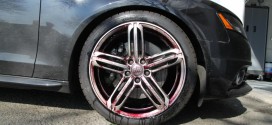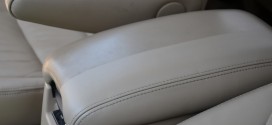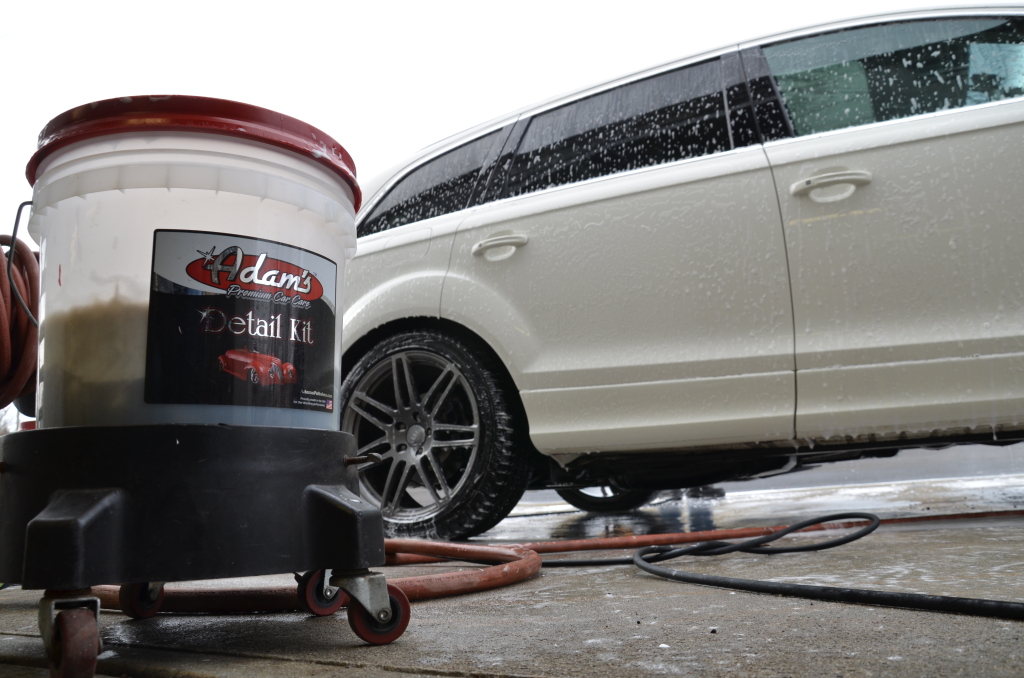Window cleaning has always been a big challenge for both detailers and car washes. It’s an area where customers demand perfection, but more times than not, they are dissatisfied with the look of their glass. We all try to provide streak free and crystal clear glass, but streaking is a huge concern. We need to understand many variables that cause window streaks, have a good technique, and use quality cleaners and towels to produce perfect windows every time.
What causes streaks?
Streaks are caused by a number of things. Some are easily controlled. Some are not. Let’s take a look at the causes.
* Window cleaner- You have to be aware of what type of window cleaner you are using to avoid streaks. Many window cleaners contain a combination of ingredients that will clean, but may also cause steaks. Those ingredients may be alcohol, ammonia, and detergents. Depending on how fast or slow these ingredients evaporate and how highly concentrated they are found in the window cleaner, you may have streaking problems. The residue from these ingredients will sometimes dry and evaporate on the glass before your window towel can remove them. Window cleaners need to be properly diluted. More is not better. The higher the concentration level is of your cleaner, the greater possibility for streaking exists.
Once you know you have the correct dilution of window cleaner and you know the cleaner is not the source of streaking, there are still other areas to examine for streaks.
- Type of towel- With so many types of towels available, it is very confusing to figure out which will be the best for window cleaning. You need a towel that is absorbent, lint free, and will actually help clean the glass. Many detailers still use terry cloth towels to clean windows, and unfortunately, these are not the best choice. Once these towels get too wet, they lose absorption and will only spread the dirt and moisture around the glass until it all evaporates on its own, leaving the glass full of streaks. These towels also leave a tremendous amount of lint. I have been searching for the best available window towel for years and still have yet to find the perfect one. However, your best choice will be a micro fiber towel in the form of a waffle weave or a 100% cotton surgical towel. I use these in combination which will be discussed later.
- Contamination- another source of streaking can be contamination. You may have contaminated towels from a few sources. If you are using your window towels for any other purpose, they may be contaminated with other products you are using. I have seen detailers use the same towel to wipe excess tire dressing from wheels and use that exact towel to clean windows and wonder why his windows were not coming out so well! Many detailers will have towels dedicated for window cleaning only, but they will wash them along with towels that have been wiping up excess tire dressing or polish and wax. All of this residue may contaminate window towels if they are all washed together. Window towels need to be washed separate from all other towels. It is also a good idea to run them through a second rinse cycle to fully wash away any contamination.
- Not using enough cleaner- Many detailers that I observe cleaning windows simply do not use enough window cleaner. They think that too much liquid will take too long to clean up, or they are afraid to get their window towel too wet, knowing this can be problematic later on. Consequently, their method of window cleaning is to use a small amount of cleaner and let the towel do the rest. This results in the cleaner being wiped up and dried too quickly and dirt just being pushed around the glass and not totally picked up. This will cause streaking.
- Spraying cleaner on the towel- I also see many detailers spray the window cleaner directly on the towel. This is incorrect. By spraying the cleaner on the towel, you are letting the cleaner soak into the towel and not soak into the dirt that is on the glass. This also equates to not enough product being used and will result in streaks.
Being in hurry- many detailers simply rush the entire process. They think the glass is fairly clean to begin with, so they give the glass a quick spritz, quickly run the towel back and forth, and assume they have correctly cleaned the window. Being in a hurry also leads to poor technique which will further enhance the possibility of streaking
Window cleaning folk lore
Some people think they have magic formulas for window cleaning such as special cleaners or special towels. It is true that you need great cleaner and really good towels to clean windows. Some people have subscribed to the theory that you do not need a window cleaning towel at all.
Many people, in many window cleaning situations, used to use newspaper to clean windows with very good results. There was a reason for this. Newspaper is very absorbent and lint free. Also, it’s virtually cost free and plentiful. When a piece gets too saturated, simply grab a new sheet. It seemed to work well. But there was a logical reason for this. The newsprint, the ink used on the newspaper, used to be kerosene based. Kerosene is a terrific cleaner. It also does not evaporate very easily. So many people used to simply spray some water on a glass surface, clean and wipe it with newspaper and they produced streak free windows. However, the ink in newspaper is no longer kerosene based, so newspaper simply is not as effective as it used to be. And although it is very absorbent, it’s very difficult to hold and get flat surfaces to wipe across the glass. You generally need to scrunch the newspaper up in your hand. By doing this, it’s very easy to miss certain spots like corners. These missed spots can be streaks, or dirt and haze that never gets fully cleaned off the surface. So, in my opinion, newspaper is not a good choice of window cleaning towel.
Towel choices
Before we talk about which are the correct towels to use, let’s make sure we know what towels not to use. Paper towels are not a good choice. They are absorbent, but many people continue to use the same piece even after its soaking wet. They also will leave a lot of lint. The same also hold true for napkins, tissues, old T shirts, handkerchiefs, etc. We need to have the correct towels to do a great job.
I use a combination of different towels. We all agree that micro fiber is the best choice for cleaning. However, some micro fiber towels do not absorb water very well and this is problematic in window cleaning. A regular micro fiber towel tends to push the liquid around the glass and never get absorbed in the towel. You need a towel that not only will clean, but will also be absorbent. With that in mind, I will use a surgical towel to perform the cleaning part of the process, and I use a waffle weave micro fiber towel to use as a final buff towel to ensure any and all residue has been wiped off.
A surgical towel is 100% cotton but lint free. It’s very absorbent, but also has some bite to it, so it will dig in and clean the glass. The waffle weave micro fiber towel is much more absorbent than regular micro fiber, so it will absorb any residual moisture and also buff the glass clean.
Before you start
The first thing to look for in cleaning windows is if there is any glue residue from old decals or stickers on the glass. If so, use an older towel to remove the glue and keep your actual window towels clean. You never want any glue on your towels as that will smear all over the glass you are trying to clean.
There are some things that need to be done before you start to clean the glass. You need your towels nearby. You can’t spray the glass, walk around looking for a towel, take a phone call, have a drink, and then clean the glass. It just won’t work. You need to be ready to go.
Next, the towel needs to be folded correctly to be able to perform its job. Most towels are approximately 16×16 inches. If you fold it across twice, you will have an 8×8 towel which fits perfectly in your hand and will give you a good cushion, be more absorbent, and allow you to easily maneuver the towel around the glass.
The technique
My cleaning window towel is the surgical towel. My buffing window towel is the waffle weave micro fiber that will finish off and buff the glass.
My towels are pre-folded and ready to go. I will spray the window cleaner directly on the glass to wet and emulsify the dirt and haze that accumulates. The cleaner should cover almost all of the glass, but not start to run down the surface. Immediately after spraying the glass I will clean the glass with my cleaning window towel. First you want to box out the area and cover all 4 corners of the glass and really make sure the towel gets into those tight corners. Then you want to overlap your stokes by about 50% in either a back and forth or up and down motion and cover the entire surface. You do not want to move in a circular direction because areas may be missed this way.
If you’re cleaning towel starts to get too dirty or too wet, open up the folded towel and use a fresher side. There is no need to wipe the window totally dry with this towel. With a little moisture still left on the glass, quickly switch to your buffing window towel to absorb and buff the remaining moisture. This process may seem like extra work, but it ensures that the glass will be as streak free and as perfect as possible.
Which window gets cleaned first?
Your choice of which window to start with is totally arbitrary, but I do have an opinion and hopefully a logical explanation of where to begin.
I begin with the front windshield. This is a fairly difficult glass to clean on most vehicles because of the very pronounced slope on many of today’s cars. I prefer to start with the most difficult glass first. Plus, I know my towels are fresh and clean and this gives me the best chance at producing a streak free finish. This really is the most important piece of glass to clean because the customer is constantly looking out of the front windshield. If you mess this glass up, the customer most certainly WILL notice and will most likely start to look for other problems.
Next, I do the rear windshield because it’s the other most looked through window and also a very difficult piece of glass to clean. Many times you will have to contort your body to reach the tight areas, while also being careful not to hit the glass with your sweaty forearms. We all know the feeling of trying to clean a hot and difficult interior on a sweltering summer day. One wrong move with your sweaty arms will mean doing that part of the glass all over again. But take your time and get it right! Don’t rush! Being in a huge hurry is a leading cause of streaks. You must be able to expertly navigate around the third brake light housing and reach the towel as deep into the rear shelf as possible to get that film at the very bottom of the rear windshield.
Once the very challenging front and rear windshields are cleaned, I can now stand back up, get out of the car and clean the side glass. DO NOT forget to lower the side glass down and inch or two to expose the upper lips of the side glass. This generally is a very dirty area. After cleaning the upper lips of all the glass, I will most likely have to throw my cleaning towel in the wash basket. It’s now pretty wet and dirty and I do not want to risk re-depositing that dirt back onto the glass. So I simply discard that cleaning towel and introduce a new one to clean all the side glass. My buffing towel should not get too wet or dirty, so that towel can stay in play.
Double check
After all the glass is completed, look for streaks. It better that you find them than the customer. Examine the glass from different angles both inside and out and look for streaks. A perfect window will look like there is no window there at all.
As you can see, window cleaning is a little more involved than it looks. Many customers will base their decision to continue to use your services based on the cleanliness of their windows. Don’t let this often overlooked problem drive customers away.
To purchase glass cleaning products click here
Article by Kevin Farrell
 Detailer's Domain The Source for All Your Car Care Needs
Detailer's Domain The Source for All Your Car Care Needs




This is perfect! I have been wanting to know how the pro’s clean glass for a while now. The cool thing is it seems like I have been doing it the right way after playing around with some different technique’s and find what works best.
Excellent advise!! I use just about the same method you do, but I usually clean all of my exterior glass with #000 steel wool to ensure a clean and streak free window. The steel wool removes just about everything, water spots, glue, fall out, sap etc… I spray my window cleaner on the window first then run my steel wool over it completely. Once this is done I then use the 2 towel process to finish. My windows usually come out perfect.
A couple comments:
1. I never liked using newspaper as it is a wood based product which can scratch. I also don’t subscribe to using abrasives to clean glass such as Scotchbrite or steel wool unless you have a spot that absolutely needs this harsh abrasive.
2. I use a microfiber towel to wipe the window clean and a second microfiber towel to dry any residue. Paper towels which are also a wood based product cause streaking and abrasion to the glass.
3. Invisible Glass works very well for me with no streaks or residue. Some folks use water with a cap full of vinegar. This does remove heavy film but it can streak also in my experience.
DD is a great source and I’m a satisfied customer.
Why was my post removed?
what post are you speaking of?
I have used steel wool on my windows for the last 20 years and never have I had a problem with scratched glass.. I use it on high end cars and mid range cars with excellent results every time. Now if someone used #0 or #00 steel wool I could see them possibly scratching the glass, but #000 and #0000 steel wool is too fine andhas just the right amount to remove any contaminants.
Newspaper has never worked for me and in my opinion leaves more of a mess than anything. Paper towels are another product I do not use. I guess everyone has their own system that works for them and mine has worked for me over the last 20 years of detailing
Phil, whats your take on glass polishing. I’ve found in a number of situations that the cars I detail come in with an enourmous amount of debris in the glass. While I clean them using the process you described I still find the glass to be “rough”. I then clay it, clean it again, polish it, and finallyclean it once more. Finally I put a sealent on it.
thanks
that should work fine, clay, polish, seal with something like Adam’s Glass Sealant.